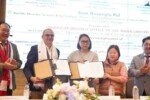ITANAGAR, Sept 27: The Arunachal Pradesh government on
Wednesday signed a memorandum of understanding (MoU)
with the Norwegian Geotechnical Institute (NGI) to explore
feasibility of harnessing geothermal potentials that the state’s
numerous hot springs offer.
The MoU was signed by state science and technology secretary
Repo Ronya and Dr Rajinder Bhasin, technical expert from NGI,
in presence of chief minister Pema Khandu, science and
technology minister Honchun Ngandam, chief secretary
Dharmendra and senior advisor of Norwegian embassy in New
Delhi, Dr Vivek Kumar.
Congratulating the NGI and the department of science and
technology, Khandu termed the signing of the MoU as a right
step towards green and clean energy production especially in
the light of global warming concerns.
“It is a great coincidence that this MoU is being signed on
World Tourism Day as its theme this year is ‘Tourism & Green
Investment’ that perfectly goes in tandem with this new
initiative,” the chief minister said.
He expressed optimism that the study would lead to
development of renewable geothermal sources in the state and
increase energy supply to meet present and future demands.
“Many of the hot springs is located in mountain areas where
generators run on fossil fuel for electricity and heating. These
can be replaced by geothermal energy with no CO2 emissions,”
Khandu said.
Admitting that this is completely a new technology for the
state, the chief minister expressed hope that NGI, with its
expertise in the field and experience in successfully
implementing a project in Ladakh, will give a new direction to
energy production that would be beneficial not only to the local
populace residing in the high mountains, but also to the army
personnel posted there.
Khandu also expressed hope that Arunachal’s relation with NGI
will go beyond harnessing geothermal resources, especially in
the fields of road construction and tunneling.
“Arunachal Pradesh is geographically and geologically
completely different from rest of the country. Therefore, a
tailor-made technology is needed for construction of roads and
tunnels here. As Norway, with similar geological features, has
one of the world’s best road infrastructure and world class
tunnels, we can benefit from its technology,” he said.
Dr Bhasin agreed with the chief minister and informed that
Norway, despite being a small country, has about 7000 km of
tunnels that shorten road distances eventually enhancing
government revenue.
Dr Bhasin, who visited a few places in West Kameng, said the
state has tremendous potential for development of
infrastructure to make it one of the best tourism states in the
country.
“I have worked for about a decade in Bhutan and I thought it
was the ultimate. But visiting Arunachal Pradesh for the first
time, I realised that I was wrong all the time. This is heaven,” he
said.
Representing the Norwegian embassy, senior advisor Dr Vivek
Kumar said the embassy is ready to facilitate cooperation
between Norwegian agencies and experts with the state
government in sectors that matter.
The current project is also being technically supported by the
Royal Norwegian Embassy through NGI.
The Centre for Earth Sciences ‘Himalayan Studies (an
autonomous organization of state’s department of science’
technology) has been interacting with NGI for technical
assistance to perform feasibility studies for harnessing
geothermal resources in the state.
The intention of the MoU is to provide a facilitating mechanism
for the two parties to work together on mutually agreed,
progressive and supportive activities; aiming for further
development in the field of geo-techniques and rock
engineering by dealing with complex sub-surface geological and
geotechnical issues faced by the state.
To begin with, NGI will carry out geological, geochemical and
geothermal investigation of few selected geothermal sites in
Tawang and West Kameng districts that will include MT survey
to decipher the deeper geo-electrical configuration of
geothermal springs (hot-springs) and feasibility to utilize the
geothermal energy resources for further use. (PTI)







